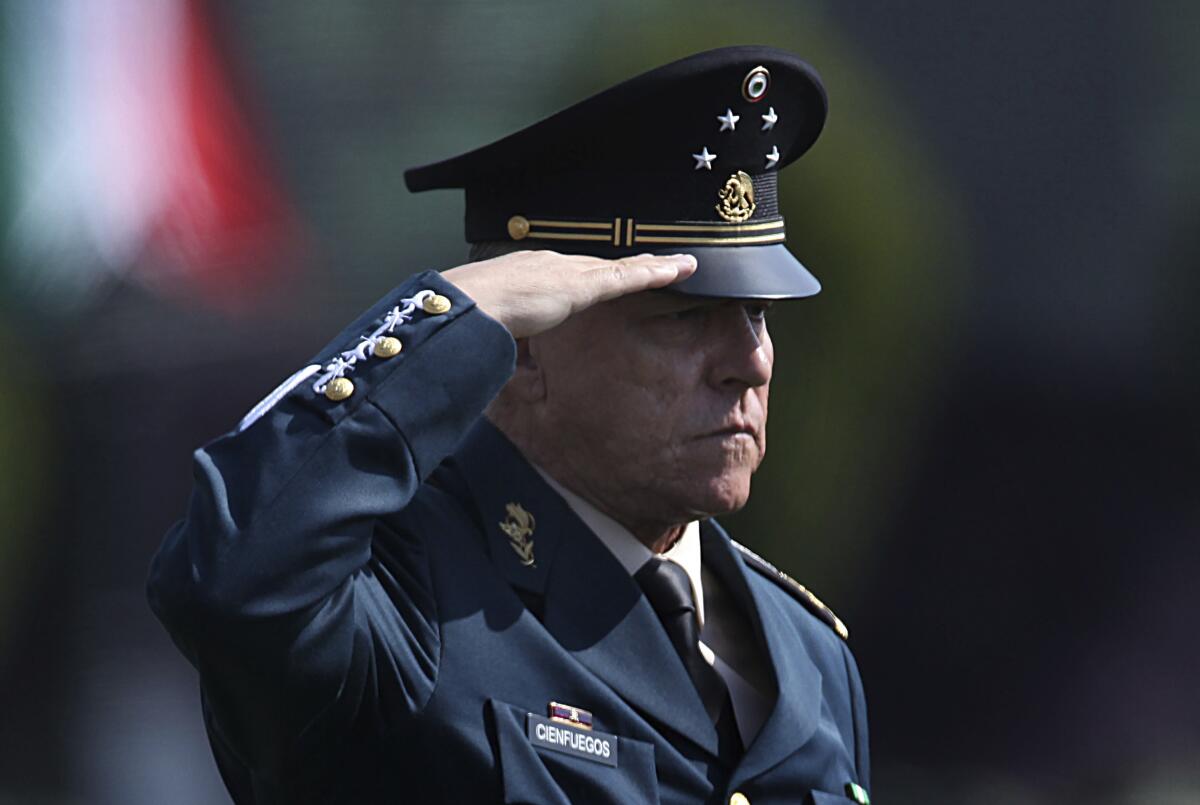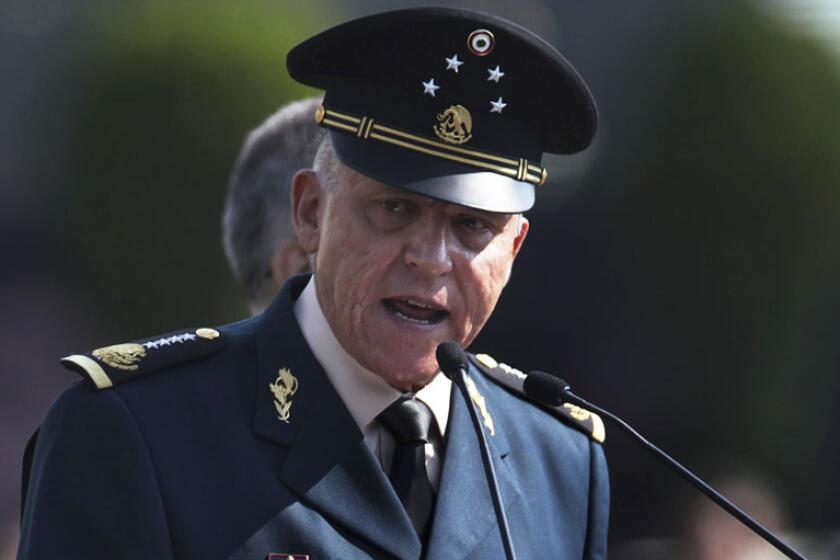Mexico stunned by L.A. arrest of former defense chief allegedly on drug cartel’s payroll

- Share via
MEXICO CITY — He was the stern-faced chief of Mexico’s armed forces, leading the battle against the nation’s powerful drug cartels.
In 2016, he denounced traffickers who had ambushed a military convoy, killing six soldiers, as “sick, insane beasts.”
Now Salvador Cienfuegos Zepeda — who served as defense minister from 2012 to 2018 under then-President Enrique Peña Nieto — stands accused of helping a Mexican drug cartel smuggle “thousands of kilograms of cocaine, heroin, methamphetamine and marijuana” into the United States, according to court documents unsealed Friday.
The former general was arrested Thursday at Los Angeles International Airport after arriving on a Delta Air Lines flight from Mexico City with several family members, according to a law enforcement source who was not authorized to speak publicly.
The developments sent tremors through Mexico’s leadership circles and jolted the country’s military establishment, a cornerstone of state power.
The news was widely seen as the latest confirmation of the insidious nexus between a long-corrupt government and the criminal gangs that hold sway over much of the country.
“It is something very regrettable,” said Mexican President Andrés Manuel López Obrador, who was elected in a landslide vote in 2018 on an anti-corruption platform.
The president said that the arrest was an example of the “decomposition” of government before he came to power and that the case did not taint the current military leaders, whom he described as “incorruptible” public servants he had appointed without Cienfuegos’ recommendation.
The U.S. investigation was apparently kept secret from Mexican authorities, leading to questions here about trust between the two countries and speculation that other officials could be targets of similar inquiries.
An indictment unsealed in U.S. District Court in Brooklyn accused Cienfuegos of four counts of drug trafficking and money laundering. He allegedly took bribes to allow the H-2 cartel — a spinoff of what is known in Mexico as the Beltrán Leyva cartel — “to operate with impunity in Mexico.”
U.S. prosecutors said Cienfuegos used his position to spare the cartel from enforcement operations, facilitate maritime transportation for drug shipments, help expand turf and introduce gangsters to Mexican officials “willing to assist in exchange for bribes.”
Evidence amassed against the former general — who was known as El Padrino, or the Godfather, according to the indictment — includes “thousands of Blackberry Messenger communications” that show direct contact between Cienfuegos and a senior cartel boss, prosecutors said in court documents.
If convicted, he could face at least 30 years in prison.
Cienfuegos appeared via video Friday in U.S. District Court in Los Angeles. He was ordered held without bail until a hearing Tuesday. Federal prosecutors plan to transport him to New York for further proceedings.
There was no immediate comment from Cienfuegos or his attorney.
López Obrador told reporters Friday that he had no official knowledge of the investigation until the arrest. Mexican authorities were not investigating Cienfuegos, he added.
Former Mexican Defense Secretary Gen. Salvador Cienfuegos, who led the country’s armed forces for six years under then-President Enrique Peña Nieto, has been arrested on drug trafficking and money laundering charges at Los Angeles International Airport.
The arrest came as another former high-ranking Mexican official, Genaro García Luna, faces federal drug trafficking charges in New York.
He served as security chief in the 2006-2012 administration of President Felipe Calderón and allegedly took millions of dollars in bribes from the Sinaloa cartel formerly headed by Joaquín “El Chapo” Guzmán, who is now serving a life sentence in U.S. prison.
Underlying the two explosive cases is a disquieting allegation: that Mexican drug trafficking organizations had senior Mexican security bosses in their pockets for a 12-year period, even as the presidents to whom the corrupt officials reported vowed to combat organized crime.
López Obrador has cited the case of García Luna in describing Mexico as a recovering “narco-state.” García Luna, who was arrested last year in Texas and is now in U.S. custody awaiting trial in New York, has denied the charges against him.
Cienfuegos, 72, who spent more than 50 years in the Mexican military before retiring in 2018, was regarded as a firm commander who seldom spoke publicly. He did, however, express reservations about the military’s controversial role in law enforcement.
Authorities here have increasingly relied on the military in lieu of police, who are widely viewed as corrupt — and, in many cases, on the payrolls of drug traffickers. López Obrador has broadened the military’s role in many areas, including fighting organized crime and deterring U.S.-bound migrants from transiting through Mexican territory.
Since being dispatched to the front lines of the anti-drug battle more than a decade ago, military personnel have been implicated in cases of torture, killings, disappearances and other crimes. Yet polls show that the military remains among the country’s most trusted institutions. That is in part because of its humanitarian work: Mexican troops regularly respond to floods, hurricanes, earthquakes and other natural disasters.
Homicides have risen to record levels in recent years even as the military has been deployed into cities, towns and villages. Officials say more than 200,000 people have been killed in gang-related violence in Mexico since 2006, when then-President Calderón began to unleash the military in force against drug syndicates.
Critics say the so-called kingpin strategy — targeting mob leaders — has served to increase violence: Lower-level gang members regularly launch bloody campaigns to assume control of fragmented criminal organizations after top capos are killed or imprisoned.
Marring Cienfuegos’ tenure in office were two notorious cases: the slayings by Mexican soldiers of at least a dozen civilians in the town of Tlatlaya, outside Mexico City, in June 2014, and the abduction and murder of 43 trainee teachers seized in Guerrero state that September. Human rights activists accused the military of misconduct in both cases.
But courts threw out charges against seven soldiers charged in the Tlatlaya case, and the military denied culpability in the disappearance of the trainee teachers.
The case of Cienfuegos recalled a scandal from more than two decades ago, when Mexico’s then-drug enforcement czar, Gen. José de Jesús Gutiérrez Rebollo, was arrested in 1997 and later convicted of working for a drug cartel that he was tasked to fight. Gutiérrez Rebollo died in 2013 while serving a 40-year prison term in Mexico.
Times special correspondent Cecilia Sánchez contributed to this report.
More to Read
Sign up for Essential California
The most important California stories and recommendations in your inbox every morning.
You may occasionally receive promotional content from the Los Angeles Times.











